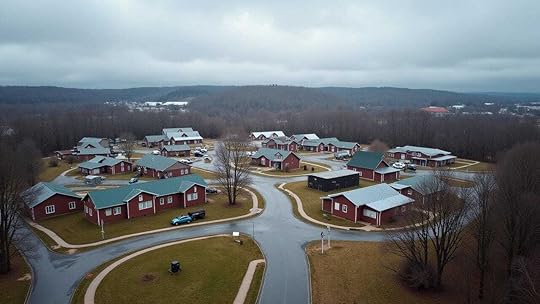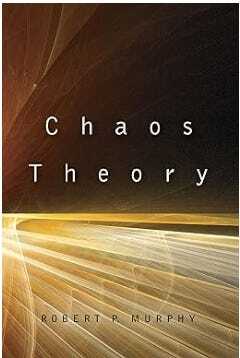The Arcane Prophecy is wrought with a certain Chaos Theory
 Aurora is based on Wintersville, Ohio, and this picture sort of looked like the town’s Overlook Hills region.
Aurora is based on Wintersville, Ohio, and this picture sort of looked like the town’s Overlook Hills region.One of the biggest perks of remote work is that I only need to change my oil once a year. And not even that, really, but to keep my aging Chevy Cruze somewhat efficient and to avoid making car payments for as long as possible, I like to get the oil changed annually, often between May and September.
The Libertarian Book Reviewer is a reader-supported publication. To receive new posts and support my work, consider becoming a free or paid subscriber.
As you probably guessed from that opening paragraph, I’m also a homebody whose idea of ‘human contact’ involves an hour or two at the gym, and to avoid getting hit by a car when I’m out running during those warmer months. Since the Northern Panhandle is full of commuters to Pittsburgh, Pennsylvania, it’s always a risk and a half to go out for a run between 5 and 6 in the evening.
But risk is fun, and I’d rather live a high-risk, liberty-loving life when I feel like it as opposed to cloaking myself in bubble wrap and joining the “good” old safety crusades. And the quaint, little village of Aurora, Etharia - a fictional town in a fictional country in my made-up world of Xadis - is just that.
See, Aurora, which hosts the for-profit 32-school Arcane Elemental Academy, is perhaps the dream village for libertarians. Nothing is publicly funded, and everything is privatized. And yep, they’re doing a pretty good job of ‘taking care of the roads,’ even in this tax-free society.
How do they succeed, even if there’s at least one bad apple in town? Simple: Voluntarism. The village itself is a mini-Prospera, so to speak, much to the chagrin of our soon-to-be antagonist and their influential political faction that seemingly every member of Etharia’s legacy media loves.
Aurora Village is constantly in chaos and it’s a beautiful thingSo, where did I get the idea for Aurora Village to insert itself into such chaos, anyway? Well, a little book by Dr. Robert Murphy called Chaos Theory. Remember when I was talking about that oil change earlier? Yeah, I was listening to the Human Action Podcast, something I need to get back into the groove of but Tom DiLorenzo’s The Real Lincoln has been taking up much of my Spotify time, during that fateful oil change.
It was a recording of one of Murphy’s lectures at Oklahoma State on invitation from the Free Enterprise Society. This episode, recorded in March 2024 (I didn’t listen until May), was called Making the Case for Private Law and Defense From Scratch.
Thanks for reading The Libertarian Book Reviewer! This post is public so feel free to share it.
It was from this episode that I stumbled across Chaos Theory, a book that is really the culmination of articles on private law and an essay on private defense. Murphy often mentioned, both in Making the Case for Private Law and Defense From Scratch and Chaos Theory, that insurance companies would play a massive role in sectors governments had traditionally taken part in.
Now, I’m not going to attempt to write a full article today about how Chaos Theory inspired Aurora Village yet, as I’d be turning a ~1,500-word post into a 10,000-word essay if that’s the correct word for it.
Instead, I wanted to stress that Murphy’s work influenced Aurora and highlight just one section of the work that he calls Doubts and I call Objections. Overall, the first four that appear in Chaos Theory deserve to be highlighted. But first…
Learn to love doubts and objectionsIt doesn’t matter where you sit on the political spectrum, horseshoe, call it what you want. One common denominator I see regardless if one is left-wing, right-wing, libertarian, centrist, or a combo, is averse to doubts and objections.
One reason is that any doubt or objection challenges one’s worldview unless the doubter is intentionally playing devil’s advocate. Anyway, while I listened to the podcast and read the book, I personally had no objections, even if I was wondering, for a while at least, how this would factor into the military.
From my point of view at one time, there wasn’t anything in the public sector that couldn’t perform better in the private sector thanks to a higher level of accountability in the latter, among other factors, like a more accurate measurement of profit and loss. But the military was the one entity I thought, at the time, was non-negotiable.
Of course, Murphy had his answer laid out. But I’ll save that one for another time, as I’ll instead highlight four of the doubts and objections in Part I of Chaos Theory, all of which I highlight in The Arcane Prophecy’s manuscript - yes, it’s a work-in-progress, even if its freebie novella, Arcane Awakenings, is available.
What if someone has no insurance?There’s one character in The Arcane Prophecy who pops up time and again in this predicament, especially if you read the work closely. They’re not popular with anyone, be it the protagonist, the main supporting cast, minor characters, or even those who play a more neutral role.
They have little freedom of movement, even if they like sneaking around and lurk in the shadows. However, they are also a major outlier here, something one of my supporting characters is clear with to my protagonist, Yote Diamondback.
Murphy highlights something similar when he refutes his doubt, saying, “So we see that those without insurance would have their options, including freedom of movement, greatly restricted. At the same time, the premiums for basic contract insurance, at least for people without a criminal history, would be quite low.”
This particular character is more of a pest than a criminal, pushing the boundaries just far enough that a crime hasn’t been committed. Sure, they’re looked on with major suspicion. But even if they had committed a crime, there would be multiple private agencies out there going after them, something Murphy also covers.
Warring AgenciesOkay, I love this one, because one of Yote’s very complicated friends is sure one of the law enforcement contractors is giving others in Aurora and its surrounding Northern Region an ultimatum - let us buy you out or we’re going to use lethal force until you agree to a buy-out.
Luckily for this character, they need not worry. Instead, it’s their bias against a specific family whose patriarch owns said company that ignites these baseless claims. For one, and Murphy isn’t shy to point this out: “This happens to governments all the time!”
Yeah, just turn on your favorite propaganda network and you’ll immediately see that taking place - there’s “only” about three of them (wars, in case you haven’t caught on) in the news right now as I write this. The leader of this agency is a character Yote will meet and there’s one clear message: The guy likes making money. And no, that’s not a bad thing.
So, even if he did want to threaten other agencies to merge under him at gunpoint and they refused, a rather expensive conflict would erupt. Maybe he’d have the money to fight it, but he’d also be suffering heavy losses as these smaller agencies would band together. Not to mention the damage he would inflict across the region.
As Murphy stated and further drove home, “...private companies take much better care of their assets than government officials take care of their subjects’ lives and property.”
This character also implied that he works with these smaller companies anyway and they specialize in smaller infringements while he takes on larger threats - like violent, mythical creatures that sometimes like to pop into the area. Hey, this work’s in the fantasy genre!
Won’t organized crime take over?I can assure you that Aurora Village has no mobsters that I know about, assuming nothing’s a front, anyway. But let’s be honest: You can make the case that the State is organized crime in and of itself - it commits theft, it has no problem dropping bombs in foreign nations, it shoves laws and regulations down our throats, and threatens even more extortion if you have the audacity to disobey.
Murphy says something similar in his work, and he lists several illegal activities, like drug dealing and loan sharking, that organized crime not involved with the State capitalizes on. Nothing in Aurora is off the table here, meaning if organized crime of any kind tried to compete with more honest innovators regarding all of the above, they’d have a tougher time capitalizing on it.
Wouldn’t insurance companies become the State?This was the objection I waited for, since if I were to sit across from someone and explain this theory, it would be the No. 1 doubt that I would anticipate. But we’re dealing with several insurance companies here taking on different niches.
This isn’t what the State does. While you can argue each department that the State owns may be a niche in and of itself, it still belongs to the same monopoly. In Aurora Village, just as would be the case in a real-world libertarian society, there would be too much competition between these entities for any one company to take over.
While we do see mergers and such taking place in our world every year, we also need to remember that there’s a lot of corporate lobbying going on and regulations to prop up select companies at the expense of others. In Aurora, as in Chaos Theory, there is no corporatism at work.




